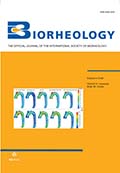Authors: Beretz, Alain | Klein-Soyer, Claude | Archipoff, Gisèle | Camilla, Christophe | Brisson, Christine | Freyssinet, Jean-Marie | Cazenave, Jean-Pierre
Article Type:
Research Article
Abstract:
Endothelial cells play an important role in the regulation of thrombosis. Normal resting (i.e. unstimulated) endothelial cells exhibit antithrombotic activity. This property is due to an active participation of endothelial cells in the inhibition of platelet adhesion and aggregation, in the inhibition of thrombin generation, in the direct inactivation of thrombin, and in clot lysis through the fibrinolytic system. When endothelial cells are stimulated by cytokines such as tumor necrosis factor (TNF) or interleukin 1 (IL-1), they may switch to an active procoagulant state. On the one hand, thrombin generation can be regulated on the endothelial cell surface by thrombomodulin,
…which allows the activation by thrombin of protein C which subsequently acquires and expresses potent anticoagulant properties. On the other hand, after activation, the same endothelial cell can express tissue factor on its surface, which will lead to the triggering of the coagulation cascade resulting in the generation of thrombin. TNF has been shown both to induce tissue factor gene expression and to suppress transcription of the thrombomodulin gene in endothelial cells. Many cytokines induce tissue factor gene expression and procoagulant activity in the monocyte/macrophage lineage; they also stimulate adhesion of leukocytes to endothelial cells. Cytokines such as IL-1 or TNF can thus be characterized as important intercellular messengers during the onset of coagulation. The role of these compounds can be schematized as: 1) agents of the stimulation of endothelial cells by leukocytes, 2) agents of stimulation of leukocytes by endothelial cells, 3) localization of the coagulation response through the initiation of endothelial cell-leukocyte interactions. Pharmacological modulation of these responses is possible along two pathways: 1) inhibition of the activation of endothelial cells or leukocytes responsible for cytokine release, 2) inhibition of the cytokine-induced cellular activation responsible for potentiation of procoagulant activity.
Show more
Keywords: Endothelium, leukocyte, procoagulant, anticoagulant, tissue factor, thrombomodulin
DOI: 10.3233/BIR-1990-273-423
Citation: Biorheology,
vol. 27, no. 3-4, pp. 455-460, 1990
Price: EUR 27.50





